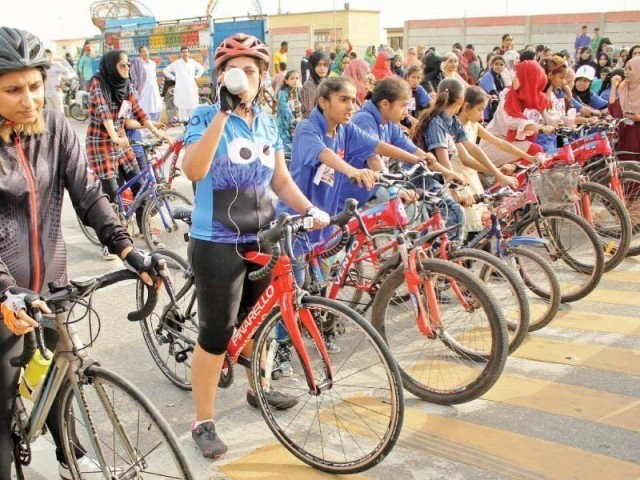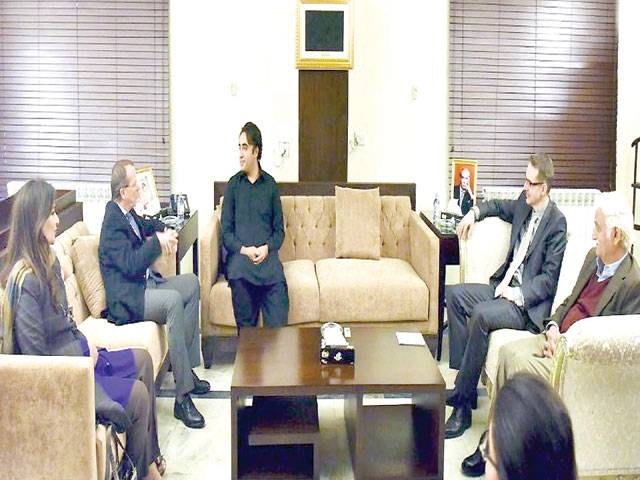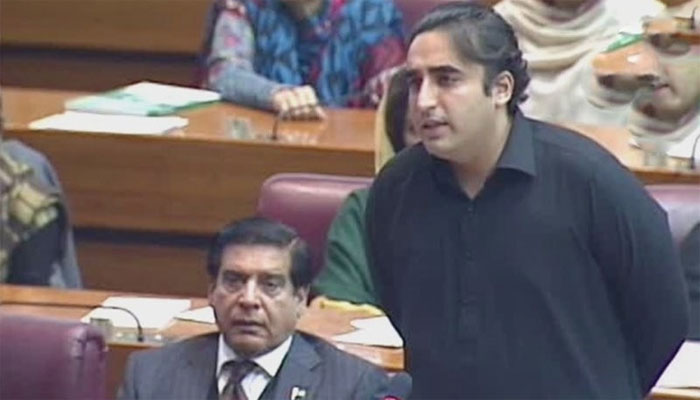M WAQAR..... "A man's ethical behavior should be based effectually on sympathy, education, and social ties; no religious basis is necessary.Man would indeed be in a poor way if he had to be restrained by fear of punishment and hope of reward after death." --Albert Einstein !!! NEWS,ARTICLES,EDITORIALS,MUSIC... Ze chi pe mayeen yum da agha pukhtunistan de.....(Liberal,Progressive,Secular World.)''Secularism is not against religion; it is the message of humanity.'' تل ده وی پثتونستآن
Friday, January 18, 2019
Inside a Teen Girl's New Life After She Escaped Allegedly Abusive Family Under Cover of Darkness
SUSAN KEATING
Brave new Canadian” teenage refugee Rahaf Mohammed al-Qunun is wide-eyed with wonder while learning to safely navigate her freshly adopted homeland of Canada, only days after a dramatic flight from her native Saudi Arabia that captured the world’s attention. a friend tells PEOPLE.
“The food, the clothing, every new thing — even the cold weather — makes her go ‘wow,’ ” says the friend, Abeer, who knows al-Qunun through an online community of women who have fled Saudi Arabia. “She ate her very first bacon and she loved it!”
On the advice of refugee workers who are concerned about the women’s safety, Abeer spoke to PEOPLE via encrypted communication and used an assumed name.
Al-Qunun, 18, became an international cause célèbre earlier this month when she took to social media after her transoceanic journey went awry.
Humanitarian observers said her plight illustrated the strictures women and girls live under in Saudi Arabia, whose culture is regulated by an intensely conservative branch of Islam. Only recently were women there allowed to drive.The daughter of a powerful Saudi Arabian governor, al-Qunun had at first escaped both her family and Saudi control under the cover of darkness on Jan. 5, boarding the first of several plane rides hoping to resettle in Australia.
She later described years of alleged abuse and called herself a prisoner under her relatives.
During a transit stop in Thailand, however, al-Qunun faced possible deportation back to her homeland. She barricaded herself inside an airport hotel room and then she went online: Writing that she had been abused, she pleaded for help via Twitter, amassing first hundreds and then thousands of followers and notice from around the globe.
Fearing she would be kidnapped, al-Qunun also wrote a farewell letter.
“I decided that I would end my life, before I was forced back to Saudi Arabia,” al-Qunun told the Australian Broadcasting Corporation.
Instead, thanks largely to the attention she had attracted, other authorities intervened and she was ultimately whisked to Canada, where she had been granted hasty asylum. Foreign Affairs Minister Chrystia Freeland welcomed the exhausted yet overjoyed teen as “a very brave new Canadian.”
“I wanted to be free from abuse and depression. I wanted to be independent,” she told the ABC. “I wouldn’t be able to marry the person I wanted to. I couldn’t get a job without permission.”
The first few days in Canada have brought both ups and downs, her friend Abeer says. Some of her everyday decisions led to rapt headlines by a curious — or exploitative — tabloid press.
“Rahaf went out to eat with friends, a decision she made herself,” Abeer tells PEOPLE. “She was not afraid of getting in trouble.”
Rahaf ate bacon, which is forbidden by Islam, for the first time in her life. On Snapchat, she posted a photo along with heart emojis, the Canadian flag and the caption “Omg bacon.”
“The feeling of freedom, it’s so hard to describe to people who have always known it,” Abeer says. “This feeling is wonderful.”
There has also been loss.
In a statement published by the ABC, al-Qunun’s family denounced and disavowed her as a “mentally unstable daughter who has displayed insulting and disgraceful behaviour.”
“It really upset me,” she told the ABC.
Al-Qunun’s father and brother had tried to visit her while she was stuck in Thailand, according to PBS, but she refused to see them. They appear not to have directly commented on her accusations of abuse.In the wake of multiple threats against her, and in light of what happened to Saudi critic Jamal Khashoggi, a U.S. resident who was reportedly murdered inside a Saudi consulate last year in Turkey, the teen now has a bodyguard.
“She never is alone,” said Mario Calla, director of COSTI, a Canadian group that assists refugees.
“It’s like moving to Disney World, but there are people who want to throw you off the rides,” Abeer says. “We must stay safe.”
Nevertheless, al-Qunan looks forward to a new, productive life. According to Al Jazeera, she has dropped the “al-Qunan” from her name, given her family’s disownment.
In a statement in Toronto on Tuesday, she talked about paying forward the help she received.
“Today and for years to come, I will work in support of freedom for women around the world,” she said. “The same freedom I experienced on the first day I arrived in Canada.”
https://people.com/politics/rahaf-mohammed-al-qanun-twitter-escape-to-canada/
Saudi Women, Tired of Restraints, Find Ways to Flee
Whenever her father beat her, or bound her wrists and ankles to punish her for perceived disobedience, the Saudi teenager dreamed of escape, she said.
As desperate as she was to leave, however, the same question always stopped her short: How would she get out?
If she ran away anywhere within the country, the Saudi police would just send her home, she feared. Saudi law barred her from traveling abroad without her father’s permission.
But during a family vacation in Turkey when she was 17, Shahad al-Muhaimeed saw her chance, and bolted. While her family slept, she took a taxi across the border to Georgia and declared herself a refugee, leaving Saudi Arabia behind to start a new life.
“I now live the way I want to,” said Ms. Muhaimeed, 19, by phone from her new home in Sweden. “I live in a good place that has women’s rights.”
World attention was drawn to the status of Saudi women after another teenager, Rahaf Alqunun, was stopped in Thailand last week while trying to make it to Australia to seek refuge there. After an international social media campaign, the United Nations declared her a refugee on Wednesday. She left Thailand on Friday and was flying to Canada, where officials said she had been granted asylum.
The phenomenon of women trying to flee Saudi Arabia is not new, coming to the world’s attention as early as the 1970s, when a Saudi princess was caught trying to flee the kingdom with her lover. The couple were tried for adultery and executed.
But the number of young women considering and taking the enormous risk to flee Saudi Arabia appears to have grown in recent years, rights groups say, as women frustrated by social and legal constraints at home turn to social media to help plan, and sometimes document, their efforts to escape.
“All these women who 15 years ago would have never been heard from can now find a way to reach out,” said Adam Coogle, who monitors Saudi Arabia for Human Rights Watch.
Some who dare to leave slip out quietly, traveling to the United States or elsewhere before applying for asylum — which is never a sure thing. Since being stopped in Turkey in 2017, two sisters, Ashwaq and Areej Hamoud, 31 and 29 respectively, have been fighting a deportation order in court, saying they fear for their lives if they return to Saudi Arabia.For other women, like Ms. Alqunun, publicity played a key role in their successful escapes, but even global attention does not guarantee that a woman will not be repatriated.In 2017, Dina Ali Lasloom, 24, begged for help in a widely viewed online video after she was stopped while transiting in the Philippines. She was held at the airport until family members arrived and took her back to Saudi Arabia, where it is unclear what happened to her.The women who make it out must contend not only with their families’ efforts to force them home, but also with the Saudi government’s extensive and well-financed efforts to do so, often involving local diplomats pressing for repatriation.
Women who are repatriated can face criminal charges of parental disobedience or harming the kingdom’s reputation.
“As Saudi women, we are still treated as property that belongs to the state,” said Moudi Aljohani, who moved to the United States as a student and has applied for asylum. “It doesn’t matter if the woman has any political views or not. They are going to go after her and forcibly return her.”
The ways women choose to flee vary, but interviews with five who succeeded showed common themes. Many had discussed their plans in private chat groups with other women who had already fled or were also considering it.
A few months before Ms. Alqunun left her family during a trip to Kuwait, for instance, a friend of hers had fled and reached Australia as a refugee and was giving her advice about escaping. Many fled from Turkey, a popular Saudi vacation spot, to Georgia, which Saudis can enter without a visa. And many aimed for Australia because they could apply for visas online, the only option for women who could not get to a foreign embassy.
Some said they had fled because of abuse by male relatives and because they felt that the kingdom offered nowhere to turn for protection or justice.Others wanted out of the kingdom’s strict, Islamic social codes, which limit what women can wear, which jobs they can pursue and with whom they can socialize. And all spoke of wanting to escape the kingdom’s male guardianship laws, which give men great power over the lives of female relatives.“It is male guardianship that made us flee from Saudi Arabia,” said Ms. Muhaimeed, in Sweden. “That is the biggest reason that the girls flee.”In Saudi Arabia, all women are required to have a male guardian, whose permission they need to get married, travel and undergo some medical procedures. The guardian is often a father or husband, but can be a brother or even a son.
The kingdom’s day-to-day ruler, Crown Prince Mohammed bin Salman, has vowed to make life better for Saudi women. He defanged the once-feared religious police, who harassed women deemed inappropriately dressed, and last year he lifted the ban on women driving. Saudi women can now attend mixed concerts and pursue careers off limits to their mothers.
When asked about guardianship laws last year, the prince said that Saudi Arabia had to “figure out a way to treat this that doesn’t harm families and doesn’t harm the culture.”
Those moves have increased his popularity among Saudi women, many of whom say guardianship is not a burden because their male relatives take good care of them. Others escape the rules by seeking jobs in neighboring countries like the United Arab Emirates, where social rules are more lax. But the system’s critics say it gives no recourse to women with controlling or abusive guardians.
That’s what sent Nourah, 20, fleeing for Australia. Her father had divorced her mother before Nourah was born, and she was raised mostly by her uncles, she said. Her father sometimes abused her, but her efforts to get help fell on deaf ears.
Last year, her boyfriend wanted to marry her, but her family refused because they perceived him as coming from a lower social class, said Nourah, who spoke on the condition that only her first name be used for her safety. Her father began to arrange her marriage to a man she did not know and who wanted to bar her from working. In October, a day before her prospective groom arrived, she ran away.
Saudi men use a government website to manage the women they have guardianship over, granting or denying them the right to travel, for example, and even setting up notifications so that they receive a text message when their wife or daughter boards a plane.In order to flee, Nourah used her father’s phone to give herself permission to travel, disabled his notifications and flew to Turkey. From there she traveled to Georgia, then bought a ticket to Australia via the United Arab Emirates, although she feared that the Emirati government would catch her in transit and return her to Saudi Arabia.
“To me that was like a suicide mission, but I had no other option,” she said.
But she made her connection and safely landed in Sydney, where she applied for asylum.
Once abroad, the women often face barrages of insults and death threats from family members and other Saudis who think they have shamed the country. While human rights groups understand why women would want to flee bad situations, they worry that doing so could put them in grave danger.
“For the few who succeed, there are many who fail, and to be sent back after this puts the women in a really dangerous situation,” said Mr. Coogle of Human Rights Watch.He said it is hard to know how many women have fled the kingdom because some who leave never seek help from aid groups, and those who do reach out sometimes fall out of contact before it is clear if they actually made an attempt to leave or, if they did, where they ended up.He said he had been contacted by many women inside Saudi Arabia who wanted help getting out. His organization did not help them do so, he said, although it would help them seek legal protection if they were outside Saudi Arabia.
Speaking from a hotel room in Bangkok where she was waiting under guard to learn if another nation would grant her asylum, Ms. Alqunun was already thinking about her new life. She wanted to go to college to improve her English and study architecture, she said.
She did not expect the transition to life in a country she had never visited to be easy, but she had no regrets.
“There is no escape other than fleeing,” she said. “There is no other way.”
With spotlight back on Saudi women's rights, Loujain al-Hathloul's fate remains unknown Facebook Twitter Reddit LinkedIn
Michelle Ghoussoub
UBC graduate has been imprisoned in Saudi Arabia since May 2018.
As Rahaf Mohammed al-Qunun, the 18-year-old who burst into the public eye by fleeing Saudi Arabia, settles into what she hopes will be a normal life in Canada, another young Saudi woman who once walked the streets of Vancouver remains in obscurity, her life imperilled.
Loujain al-Hathloul, who graduated from the University of British Columbia in 2014, has been detained in Saudi Arabia along with a number of Saudi women's rights activists since May 2018.
Al-Hathloul hasn't been heard from publicly since, but reports from a number of human rights groups allege she's faced torture and sexual harassment behind bars.
In contrast, Al-Qunun's voice was heard internationally, as she barricaded herself in a Thai hotel room, broadcasting pleas for help over social media.
On Saturday, she landed in Toronto and was greeted by Foreign Affairs Minister Chrystia Freeland. She has since told CBC News she's dropped her family name.
A prominent activist herself, al-Hathloul's case has been widely covered, most recently in a New York Times op-ed by her sister. Shortly after her arrest last spring, Saudi Arabia's state-run press agency issued a statement saying state security had arrested a number of people for forming a cell and trying to destabilize the country using foreign funding.
Advocates and friends of al-Hathloul said they've become frustrated and concerned at the lack of action in her case, which has grown increasingly dire.
"We've really been encouraging Canada to have a consistent principled stance to our very serious and pressing human rights concerns in Saudi Arabia."
'Feels more and more dire'
Saudi Arabia ranks among the worst countries for women's rights and equality. The World Economic Forum ranked it 141 out of 149 in its 2018 report on gender equality.Though Freeland tweeted about al-Hathloul's detention shortly after she was arrested, Global Affairs has since said little about her case.
"As we have said before, we believe that the imprisonment of these activists runs counter to the Saudi government's stated goal of reform," a statement from Global Affairs read in part.
Commenting on Mohammed's case, the Wednesday statement said "the Office of the United Nations High Commissioner on Refugees (UNHCR) requested that Canada grant her asylum. We accepted."
Sima Godfrey, a professor at UBC who taught al-Hathloul during her time in Vancouver, said while she was "delighted" to see Canada had intervened in Mohammed's case, it was also a stark reminder that her former student remains behind bars."I was reminded that Loujain's situation hasn't changed since May and the longer she is being held, the worse conditions are getting. With the latest information about torture and threats of rape and murder, it just feels more and more dire," she said.
"One can only hope that things will improve, but there are no signs right now."
Godfrey said she hopes Canada is working on the case through quiet diplomacy and back channels, in order to avoid the diplomatic firestorm triggered when Freeland tweeted about jailed human right's activist Raif Badawi.Freeland's comments drew an angry response from Saudi Arabia, which expelled Canada's ambassador, sold Canadian assets and stopped flights to Canada on its national airline.
"In some ways it's not a surprise that these women became the flashpoint," said Godfrey.
"And they become all the more admirable for that reason, because they are so courageous in that context."
#Pakistan - In #Peshawar Unnecessary referrals from districts causing death of newborns
Unnecessary referral of newborns from district hospitals coupled with shortage of equipment and trained staff in Peshawar-based teaching hospitals have been causing deaths of preventable ailments, according to sources.
Paediatricians say that 16 per cent of the neonates die at nursery ward of Khyber Teaching Hospital (KTH), 30 per cent at Lady Reading Hospital (LRH) and 25 per cent at Hayatabad Medical Complex (HMC) Peshawar mostly due to late referral by doctors from the district headquarters hospitals and shortage of facilities at the Peshawar’s hospitals to deal with load of patients.
“The factors accounted for deaths are 40 per cent infections, 29 per cent premature delivery, 22.5 per cent birth asphyxia and 15 to 20 per cent. jaundice,” they say. Bed occupancy in these hospitals remains more than 200 per cent.
Experts say teaching hospitals short of space, equipment for neonates.
Each of the three hospitals -- KTH, LRH and HMC -- admits more than triple patients of their capacities, which lead to infections. “KTH is extremely short of space and has to admit three infants on one cot due to which they get infections and don’t get care to a desired level,” say paediatricians.
According to them, the teaching hospitals have well-qualified doctors and health workers but they are unable to give proper attention to additional patients and it affects the healthcare services.One year ago, the government of Turkey gave seven incubators to KTH and five of those went out of order owing to electricity fluctuation.The situation in LRH and HMC is more or less the same as newborn babies are referred from all districts of the provinces, making it difficult for the staff to provide treatment to the patients to a desired level.Recently, HMC got specialised nursery unit but mortality was still 25 per cent because of extreme load of patients, a senior pediatrician told Dawn.According to him, the neonates can get quality treatment if the district hospitals stop referral of patients to Peshawar-based health facilities.
The government has been establishing medical colleges in district now and then but the attached hospitals are short of facilities for newborns. The hospitals, which are required to keep at least five cots empty for critically-ill neonates to give them emergency treatment, can spare a single cot owing to which the people requiring prompt treatment cannot get it. These hospitals have brought the issues into the notice of the government but all such requests haven’t been responded and children up to 30 days of age continue to suffer.
The well-off people visit a few private maternity homes where facilities exists but majority don’t afford the cost, which runs from Rs10,000 to Rs20,000 per 24 hours.
Pakistan Pediatrics Association says that 54 neonates die in every 1,000 live-births annually while 16 per cent neonates die due to infections and premature births.
The association blames shortage of basic equipment including incubators, cardiac monitors, phototherapy, resuscitator, apnea alarm, jaundice meter, infusion pumps, pulse oximeter and oxygen checking machine, which adversely affects the patients.Recently a study carried out at one of the teaching hospitals showed that 50 per cent patients visited Peshawar despite presence of hospitals in their native districts.
The government has been claiming to put in place a proper referral system of patients but the plan is yet to materialised.
#Pakistan - Women cycling event in #Peshawar cancelled after opposition from religious party
By Shahabullah Yousafzai
The first ever female cycling event scheduled for January 19 in Khyber Pakhtunkhwa (K-P) was cancelled on Friday due to security concerns and protest calls from religious parties.
The race was sponsored by a Peshawar-based non-governmental organisation (NGO) Zamung Jwand which works for women empowerment in the province.
The event, however, was opposed by a religious party in the provincial capital.The organiser of the event, who hails from Waziristan, currently resides in Peshawar and is working towards improving public spaces and sports facilities for women in the province.
According to a press release, Jamiat Ulema-e-Islam-Fazl (JUI-F) leader Rafiullah Qasimi warned that “roads shall be blocked” and that the party shall take the law into their hands if the event is conducted.
A notification released by K-P director-general denied granting permission to any NGO to hold cycling events in Hayatabad. It further read that the Hayatabad Sports Complex has not been booked for the January 19 event.
#Pakistani journalists calling my article a publicity stunt is the biggest disappointment
TAHA SIDDIQUI
I want Pakistan to become better and the only way that can happen is by highlighting the wrongs, writes Taha Siddiqui.
An opinion piece I wrote last week marking one-year of my self-imposed exile in Paris after an attack on my life has opened floodgates of hatred – from Pakistan and its top-rung leaders.
But my biggest disappointment is the lack of any support from the local press in Pakistan, with some prominent members even taking to social media to attack me, question my motives for writing the piece and calling it a publicity stunt. A few even claimed that there is no threat to press freedom in Pakistan and I am merely exaggerating it.
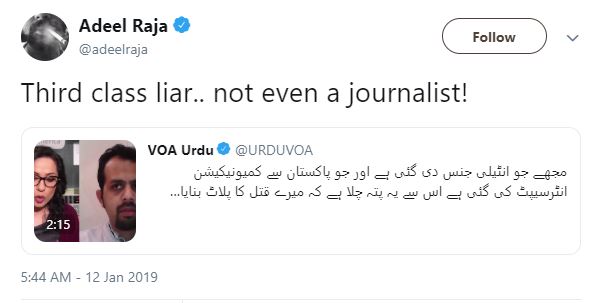
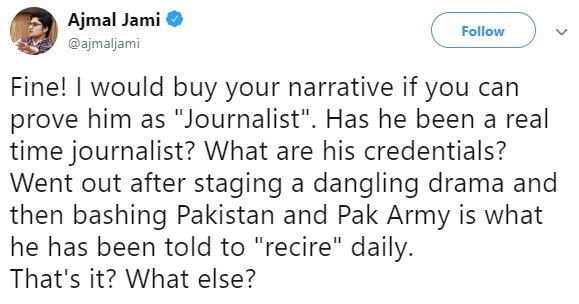
Silence of media
The reason why I chose to go public with the information I recently received from the US intel about a possible assassination plot against me in Pakistan, in my piece for The Washington Post, is because I value freedom of press and believe in exposing those who threaten it.
When Pakistan’s federal information minister Fawad Chaudhry tweeted against me and called my piece “malafide use of pen”, the local media remained suspiciously silent. This is the same press that considers anything this minister says even as a passing remark as ‘breaking news’. The double-standard was hard to miss.
This, at a time when Pakistan’s oldest and reputed newspaper Dawn is facing supply disruptions allegedly at the behest of the Pakistan Army, and one of its reporters is facing treason charges.
A leading media channel like Geo News had to reportedly make a deal with the military to come back on-air after disappearing from cable networks. And a monetary crunch, allegedly engineered by the establishment, has led to several journalists losing jobs.
But it appears that Pakistani journalists in their pursuit to be in the good books of the military seem to go an extra mile to not just censor themselves but also defend their oppressors, as I witnessed in the aftermath of my piece.
Reaction from Army
While the media’s reaction to my piece left me disappointed, the troll army’s attack was on the expected lines, spewing venom and hatred
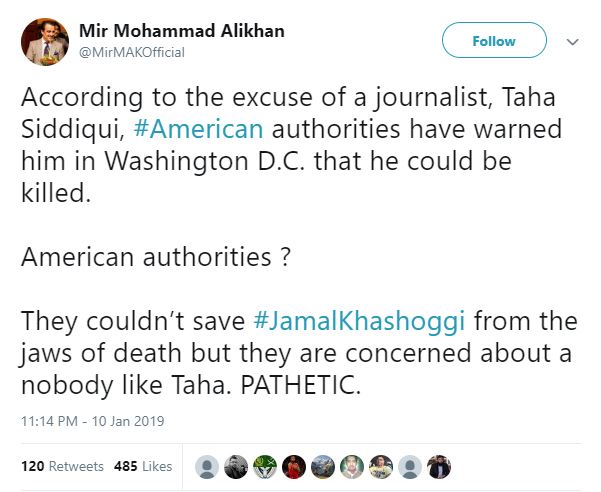
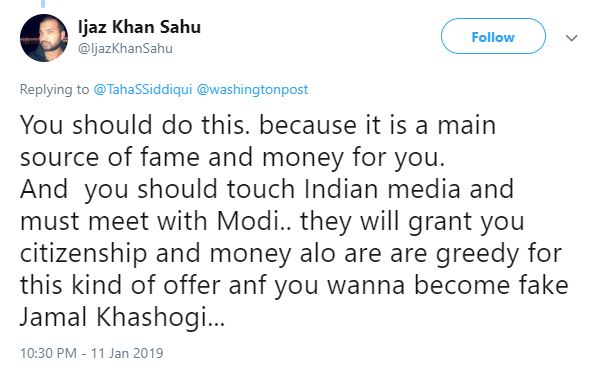
But the response that left me unnerved came from Pakistan Army’s spokesperson Major General Asif Ghafoor in the form of a tweet about “stray dogs are (being) the responsibility of community corporation…”. In Pakistan, stray dogs are mercilessly poisoned or shot dead by the municipal corporations.
He is the brain, I believe, behind the menacing trolls who target me. Since Ghafoor’s tweet, many of these trolls have been tagging me in his post, pointing out that the general is referring to me.
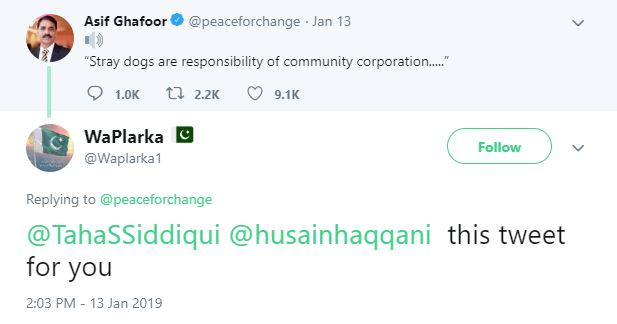
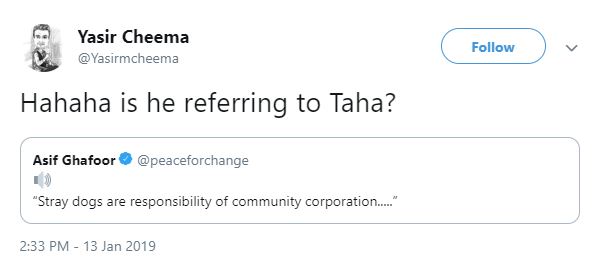
Many of my well-wishers in Pakistan also think the same.
I cannot be certain if it is indeed so but one of the first responses to his tweet from a verified handle is deeply troubling. The user talks about setting up a Pakistani version of Bozkurtlar – a Turkish death squad that has been accused of involvement in assassinations in and outside Turkey.
Ironically, Major General Ghafoor had earlier invited me back in Pakistan through multiple tweets. In the light of the fresh information about a possible assassination plot against me, one doesn’t know if his invitation was a trap.
Why I will speak up
Despite the disappointments, hatred and risks, why do I continue to speak up? Because, I want Pakistan to become better and the only way that can happen is by highlighting the wrongs. However, the backlash for the opinion piece that I wrote last week made me wonder if there was anything wrong in what I said.
But then I realised I am not the only one facing such hostility. Many Pakistanis, who are celebrated globally, are demonised back home. I have seen people question the motives of peace activist Malala Yousafzai, and disown scientific minds like Abdus Salam, the country’s first Nobel laureate. Now, there are efforts to discredit renowned lawyer Asma Jahangir, recipient of the 2018 UN Human Rights Prize.
At the same time, likes of Mumtaz Qadri, the assassin of Punjab province’s governor Salman Taseer, Osama bin Laden, the 9/11-mastermind, and Hafiz Saeed, the man behind the Mumbai terror attacks, are celebrated as heroes.
When I see such problematic narratives and belief systems, I realise what the Pakistani society needs – introspection and a will to challenge the years of indoctrination and hate taught from childhood.
Pakistan is hurtling towards an implosion if policymakers don’t take immediate steps to address this situation.
We have a society that is sick, and if we don’t treat it soon, Pakistan will become a place where no one will be safe.
#Pakistan - #PPP - German envoy calls on Bilawal Bhutto
German Ambassador to Pakistan Martin Kobler yesterday called on Pakistan People’s Party chief Bilawal Bhutto Zardari here. Senator Farhatullah Babar, Senator Sherry Rehman, Senator Annie Marri and Jamil Soomro were present on the occasion. “Matters of mutual interests were discussed in the meeting,” said a party statement.
https://nation.com.pk/18-Jan-2019/german-envoy-calls-on-bilawal-bhutto
صوبائی حقوق کسی کو چھیننے نہیں دینگے، بلاول
چیئرمین پیپلز پارٹی بلاول بھٹونے کہاہے کہ دو تہائی اکثریت سے ہونی والی
اٹھارویں ترمیم اورقانون سازی کو غیر منتخب لوگ بیک جنبش قلم ختم نہیں کرسکتے‘این آئی سی وی ڈی وفاق کودینا اٹھارویں ترمیم پر حملہ ہے ، صوبوں کے مالی معاملات پر سمجھوتہ نہیں کیاجائے گا‘ کسی کو صوبائی حقوق نہیں چھیننے دیں گے‘اٹھارویں ترمیم کے خلاف کارروائی کی بھرپور مزاحمت کریں گے‘ سلیکٹڈ وزیر اعظم انسانی حقوق اورنقل وحرکت کی آزادی کے تصور کو نہیں سمجھتے ‘ای سی ایل پر صرف اپوزیشن ارکان کے نام ڈالے جارہے ہیں‘ ای سی ایل میں میرانام ڈالنے سے کوئی فرق نہیں پڑتا ۔ گزشتہ روز قومی اسمبلی میں خطاب کرتے ہوئے انہوں نے کہا کہ سپریم کورٹ نے میرا اور وزیر اعلیٰ سندھ کا نام ای سی ایل سے ہٹانے کا حکم دیا ہے آج صبح وزیر اعظم نے ٹویٹ کیا ہے اور ای سی ایل کے ایشو پر بولے ہیں کیا ہی اچھا ہوتا اگر وزیر اعظم ایوان میں موجود ہوتے اور میرے منہ پر بات کرتے میں ان کو جواب دیتا،لیکن وہ ایوان آنے کی ہمت نہیں کرتے‘ فریڈم آف موومنٹ
بنیادی حقوق میں سے ہے جس پر کٹھ پتلی حکومت یقین نہیں رکھتی‘ انہوں نے کہاکہ میرا نام ای سی ایل سے ہٹائیں یا نہ ہٹائیں کوئی فرق نہیں پڑتا،انہوں نے کہا کہ سندھ کے اسپتال اٹھارویں ترمیم کے بعد صوبائی حکومت نے لیے اور ورلڈ کلاس ادارے بنا دیے ہیں‘این آئی سی وی ڈی ( نیشنل انسٹی ٹیویٹ آف کارڈیو ویسکولر ڈیزیز)کے لیے 14 ارب روپے بجٹ رکھا گیا ہے ۔ سپریم کورٹ نے یہ ادارہ وفاق کو دینے کا فیصلہ کیا ہے سپریم کورٹ نے یہ ادارے دینے ہیں تو سند ھ کے عوام کو ان کے لیےسمجھانا مشکل ہو جائے گا‘اگر اپ نے یہ ادارے لینے ہیں تو 14 ارب کی گارنٹی دینا پڑے گی کہ مفت علاج جاری رکھا جائے گا‘انہوں نے کہاکہ اپوزیشن اتحاد میں جس پر اتفاق رائے ہو ا وہ عوام کے جمہوری معاشی وبنیادی حقوق تھے مجھے امید ہے حکومتی اتحادی بھی ہمارا ساتھ دیں گے اور جلد پی ٹی آئی بھی ہمارا ساتھ دے گی کیونکہ یہ اہم ایشو ہیں ان پر کوئی سمجھوتہ نہیں کیا جاسکتا ہے ہم ہر صورت صوبائی حقوق کاتحفظ کریں گے ۔
Subscribe to:
Comments (Atom)







